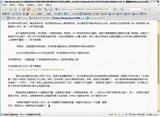To teams and companies in WEB2.0: It's more than just pouring cold water
When the Internet noisily entered the 2.0 era, when Internet technology was no longer so unattainably advanced, and when copying became an everyday occurrence, the Internet became lively.
Myspace became popular, and more Myspaces sprouted up in China.
YouTube had just started, and video websites popped up all over China.
51.com emerged out of nowhere, and countless Social Networking Services (SNS) appeared in China.
Facebook changed the way Chinese webmasters plagiarized; they stopped imitating others and instead focused on local success like Xiaonei (a Chinese social network).
...
When copying becomes a habit, what I want to say is: imitation, webmasters, are you ready?
If you plan to create a junk site or a website just to earn some ad revenue, please do not read this article. I will discuss the issue of imitating Web 2.0 sites from a technical perspective.
When investment and traffic are not problems, what I want to ask is: Are things really going smoothly for you?
Take SNS sites as an example. When hastily launched 2.0 sites receive large investments and gain traffic, where does your confusion lie?
...



